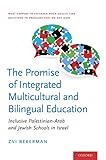Promise of integrated multicultural and bilingual education inclusive Palestinian-Arab and Jewish schools in Israel
Material type: TextPublication details: New York Oxford University Press 2016Description: xii, 355 p. 25 cmISBN:
TextPublication details: New York Oxford University Press 2016Description: xii, 355 p. 25 cmISBN: - 9780199336517
- Multicultural education -- Israel
- Education, Bilingual -- Israel
- Cultural pluralism -- Study and teaching -- Israel
- Intercultural communication -- Israel
- Intergroup relations -- Israel
- Peace -- Study and teaching -- Israel
- Palestinian Arabs -- Education -- Israel
- Jews -- Education -- Israel
- PSYCHOLOGY / Social Psychology
- 370.117095694 23 BE-P
- LC1099.5.I75 B45 2016
- PSY031000
 Print
Print
| Item type | Home library | Collection | Call number | Status | Date due | Barcode | |
|---|---|---|---|---|---|---|---|
 Print
Print
|
OPJGU Sonepat- Campus Main Library | General Books | 370.117095694 BE-P (Browse shelf(Opens below)) | Available | 135950 |
Browsing OPJGU Sonepat- Campus shelves, Collection: General Books Close shelf browser (Hides shelf browser)
Includes bibliographical references and index.
Machine generated contents note: -- Introduction -- Part 1 -- Chapter 1: Positioning the Author -- Chapter 2: Theoretical Perspectives -- Chapter 3: Methodology: From Theory to Implementation -- Chapter 4: Schools in Their Contexts -- Part 2 -- Chapter 5: The Parents -- Chapter 6: Teachers at Their Work -- Chapter 7: The Children -- Part 3 -- Chapter 8: School Routines: Culture, Religion, and Politics in the Classroom -- Chapter 9: Ceremonial Events -- Chapter 10: Conflicting National Narratives -- Part 4 -- Chapter 11: The Graduates -- Chapter 12: Conclusions.
"The Promise of Integrated and Multicultural Bilingual Education presents the results of a long-term ethnographic study of the integrated bilingual Palestinian-Jewish schools in Israel that offer a new educational option to two groups of Israelis--Palestinians and Jews--who have been in conflict for the last one hundred years. Their goal is to create egalitarian bilingual multicultural environments to facilitate the growth of youth who can acknowledge and respect "others" while maintaining loyalty to their respective cultural traditions. In this book, Bekerman reveals the complex school practices implemented while negotiating identity and culture in contexts of enduring conflict. Data gathered from interviews with teachers, students, parents, and state officials are presented and analyzed to explore the potential and limitations of peace education given the cultural resources, ethnic-religious affiliations, political beliefs, and historical narratives of the various interactants. The book concludes with critique of Western positivist paradigmatic perspectives that currently guide peace education, maintaining that one of the primary weaknesses of current bilingual and multicultural approaches to peace education is their failure to account for the primacy of the political framework of the nation state and the psychologized educational perspectives that guide their educational work. Change, it is argued, will only occur after these perspectives are abandoned, which entails critically reviewing present understandings of the individual, of identity and culture, and of the learning process"--
"The Promise of Integrated and Multicultural Bilingual Education presents the results of a long-term ethnographic study of integrated bilingual Palestinian-Jewish schools in Israel that offer a new educational option to two groups of Israelis--Palestinians and Jews--who have been in conflict for the last one hundred years"--
There are no comments on this title.








